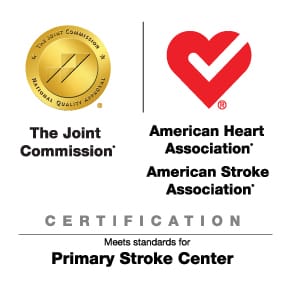Stroke Care
Care you can count on


Know the stroke warning signs
When a stroke strikes it is important to recognize what is happening and act rapidly. One easy to remember way is BE FAST.
B - Balance: Sudden loss of balance or coordination
E - Eyes: Sudden vision change/trouble seeing
F - Face: One side of the face droops when the person smiles
A - Arm: One arm drifts down when the person raises arms
S - Speech: Person's speech in slurred, slow or strange
T - Time to call 9-1-1
Stroke is one of the leading causes of death and disability for those in the United States. Due to our commitment to providing the highest level of stroke care for our community, Adventist Health Hanford is proud to have achieved Advanced Primary Stroke Center accreditation. In November 2019, the hospital earned The Joint Commission Gold Seal of Approval and the American Heart Association’s Heart-Check mark for Advanced Primary Stroke Certification. This means the hospital has the processes and teams in place to best care for stroke patients.
Experiencing a stroke is scary, but when a patient walks into the emergency room at Adventist Health Hanford, they are already on their road to recovery, thanks to an immediate assessment and step-by-step care that continues even after they go home.
If you think you or a loved one might be having a stroke, call 9-1-1 or visit the ER immediately. Time is of the essence.
Providers and emergency staff will quickly stabilize stroke patients to avoid or reduce permanent damage. A neurologist and telemedicine services are also available for immediate stroke care. Telemedicine allows a neurologist to consult with Adventist Health physicians and patients through a web cam 24-hours a day 7-days a week. Through this technology, neurologists may observe and interact with patients to make medical recommendations for the best possible outcomes.
Some of our specific stroke services include caring for:
- Ischemic stroke: Results from an obstruction in a blood vessel supplying blood to the brain
- Transient ischemic attack (TIA, or "mini-stroke"): A temporary blockage in a blood vessel supplying blood to the brain, usually lasting only a few minutes; a TIA can be a warning sign of stroke
- Carotid stenosis: Narrowing of the carotid arteries, which supply blood to the brain, due to atherosclerosis or build-up of fat, cholesterol and other substances in the blood stream
Seeking immediate treatment — within 90 minutes — for stroke and symptoms like stroke significantly increases your chances for recovery and survival.